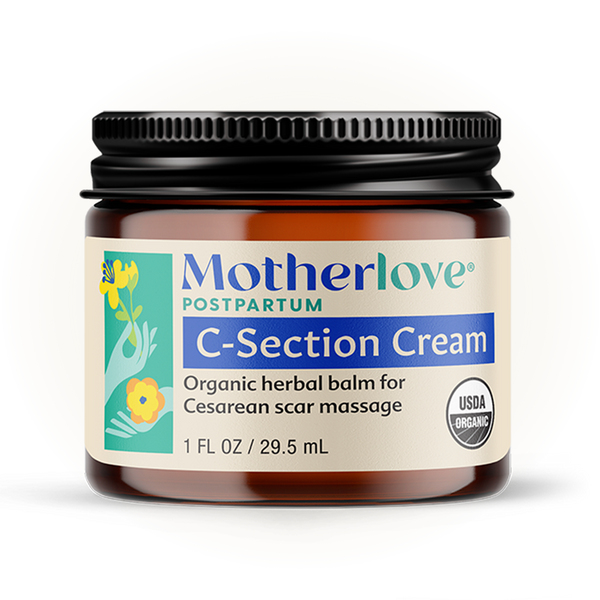Written by: Wendy, IBCLC
Most of us don’t plan on having C-sections, but about a third of birthing parents end up delivering their babies via C-section. Being a C-section parent isn’t something anyone should be ashamed of. We can’t always control how our births go, and it’s really true that in the end, the most important thing is a healthy parent and baby.
That being said, it doesn’t make sense to minimize the impact that C-section deliveries can have on our bodies. C-sections are major abdominal surgery, and can make recovery time last longer and be more intense. But knowledge is power, and knowing what to expect when it comes to C-section births makes the recovery period that much smoother.
HOW IS C-SECTION RECOVERY DIFFERENT?
When you have a C-section birth, a surgical incision is made in your abdomen to safely deliver your baby. Unless the C-section is an emergency, the surgery is done with a local anesthetic (as opposed to general anesthesia) so that you can remain awake during the surgery. You can also request that your baby be put on your chest after delivery so that the experience is as gentle and intimate as possible.
C-sections usually take longer to recover from than vaginal births, and often have a more intense impact on the postpartum experience.
For example:
- You will likely have to remain in the hospital a few days longer than if you’d had a vaginal birth
- You will be experiencing the after-effects of medications you were given during surgery, which will often make you feel groggy
- You will be more limited in your movements for a few weeks postpartum, and will be discouraged from heavy lifting
- You will be in pain from the surgery, and will need postpartum pain medications
- Basic bodily functions (like peeing and pooping!) will take some time to adjust to
- You will be needing to care for your incision area so that it doesn’t get infected and so that it heals properly
- You may find breastfeeding more difficult and that you need to find more creative breastfeeding positions so that your baby doesn’t put pressure on your incisions why they nurse
- You may find that it takes your milk a little longer to come in after you’ve had a C-section
Probably the most important thing you can do as a C-section parent is educate yourself and be prepared. Knowing what to expect and what is normal will make the whole experience much less stressful!
It’s important to understand and accept that you just underwent major surgery, that your body will need to take time to recover, that it’s okay to accept offers of help (and to ask for them!).
TIPS FOR CESAREAN RECOVERY
1. Rest and stay off your feet
This is probably the hardest one for many of us, especially if we were used to being on the go before we had kids or if we have multiple kids to care for. But C-section recovery is not the time for any of that. Your medical team will be telling you to stay off your feet for a few weeks, and you need to listen to them!
In the first few hours after birth, it will be difficult to even get out of bed — that’s normal. Even after that, you will want to take it easy and avoid any pressure on your surgery scar, and avoid heavy lifting. Keep all your essentials by your bed or the couch, such as your phone, drinks, and snacks, etc.. Additionally, have your partner or other helpers take care of you (and the baby!) as much as possible.
2. Take care of your incision
As you are healing, you should follow whatever instructions your surgeon gives for caring for your C-section incision, including any cleaning and bathing routines. Some surgeons will use dissoluble stitches to close the incision; some will use surgical glue. If you’ve had traditional stitches or staples, you will need to return to your surgeon about a week later to have them removed. You should watch for any signs of infection (pain, tenderness, reddening, or puss at the infection site, plus fever).
As your incisions site heals further, you can consider how to minimize scarring. Talk to your surgeon about this, but usually this involves gentle massaging of the area as well as applying scar creams like Motherlove's organic C-Section Cream.
3. Manage your pain
Again, you will be recovering from surgery, so you can expect a fair amount of pain in the days following your C-section. You will also be experiencing afterpains as your uterus shrinks back to its normal pre-pregnancy size.
Now is not the time to be a martyr. Take whatever pain medication your medical team advises and that works for you. Most pain medications are compatible with breastfeeding. If you aren’t sure, you can ask the hospital lactation consultant, or consult LactMed, a government sponsored database that lists medications and their effects on breastfeeding. Heating pads and other types of heating therapies are also an option for dealing with post C-section pain.
HOW TO MAKE BREASTFEEDING WORK AFTER A C-SECTION
Many parents get worried that having a C-section means that breastfeeding is less likely to be successful. While it’s important to note that breastfeeding can make breastfeeding more challenging, that doesn’t mean that breastfeeding is doomed to fail. Not at all! It just means that you might need a little extra help along the way.
If you want to breastfeed after a C-section, you will want to keep your baby off your incision as you heal, so that means utilizing positions such as the football hold and the side-lying position. You can also try leaning back in whatever position you are in to allow for extra room for your baby.
Some (but not all) parents find that their milk comes in a few days later with a C-section than a vaginal birth. You can minimize this by practicing skin-to-skin in the first few days postpartum, breastfeeding frequently and on demand, and getting help with any latching issues ASAP. Have faith that your body will know what to do to make that milk start flowing.
In many ways, having a C-section actually goes well with breastfeeding, because one of the best ways to get breastfeeding off to a good start is to spend a lot of time in bed, nestled up with your baby, nursing frequently. And C-section parents are advised to rest in bed anyway! So allow yourself to get pampered: have any helpers at home tend to your home, bring you meals and snacks, change your baby’s diaper, burp your baby – and leave you to rest and nurse.
THE BOTTOM LINE
Don’t despair if you end of needing to have a C-section birth. Some moms feel guilt and shame over that fact, and while these emotions are understandable, you are no less of an awesome parent because of our C-section. In fact, C-section parents are among the strongest and most incredible parents out there.





